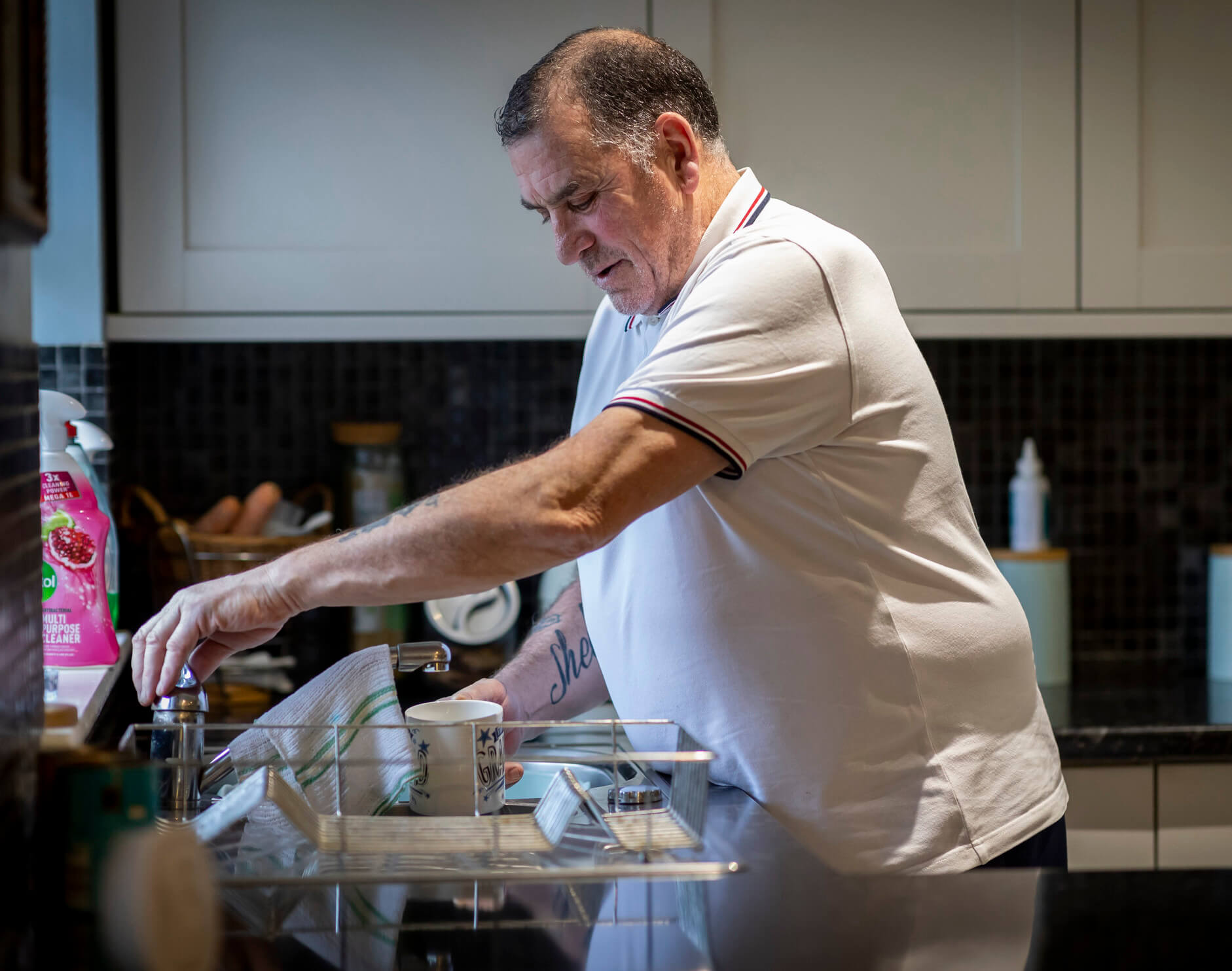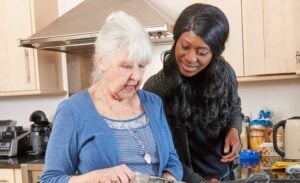Informal carers – building a contingency plan
Tags
Elderly Care
If you’re looking after a loved one, creating a contingency plan – outlining who can take over their care, where their medication is stored, and what their day to day care looks like is crucial for ensuring their well-being and safety of in case of emergencies, or if something unexpected happens. Learn how to develop an effective plan in this article.
What is informal care?
Informal care is any form of unpaid care provided by a friend, family member or spouse. While many informal carers provide personal care and help with medication, they often spend more time helping a loved one with the practical side of daily living. This can include things like shopping, running errands and driving them to appointments, cooking meals, keeping the home clean, and doing laundry.
Informal carers may also spend time keeping an eye on a loved one – this may mean they don’t need to lend a hand all the time, but are available to jump in to prevent an accident, offer reassurance, or report a change in their behaviour or health to the right professional.
When it comes to the elderly, informal caregivers make a huge contribution to the UK’s provision of care. However, family and friends can’t be expected to, and shouldn’t need to look after their loved ones on their own forever. That’s why it’s so important to think about the future and have a plan for if you’re unable to continue looking after a loved one.
Am I an informal carer?
The Department of Health and Social Care (DHSC) describes an informal carer as someone who provides unpaid care to a friend or family member needing support, perhaps due to illness, older age, disability, a mental health condition or an addiction”, as long as they are not employed to do so.
This definition is fairly broad, and means that you could provide 10 minutes or 100 hours per week – you’d still be categorised as an informal carer.
Why do informal carers need a contingency plan?
Even with the best of intentions, providing long-term care informally is, unfortunately, not always sustainable for a number of reasons.
Many informal carers are looking after a partner or spouse well beyond retirement age – which is a huge responsibility to take on in later life. In fact, the King’s Fund found that more than one-fifth of carers who were living with the care recipient (the person they were caring for) provided care for 100 or more hours a week, whilst Age UK found that carers over 80 years old were providing 23 million hours of unpaid care a week in their research.
Taking on the caregiving strain alone, when you’re likely to have your own health issues, isn’t good for anyone, and may even lead to accidents resulting in emergency care being put into place.
Informal caregivers looking after elderly parents or grandparents can often face difficulties too, especially if they’re trying to balance their caregiving role with looking after their own children, maintaining a career, or dealing with financial responsibilities like paying a mortgage.
The caregiving role can change over time too. If a loved one’s health gets worse, an informal carer may find themselves unable to cope alone, or lacking the specialist skills that are needed to best support their loved one.
Did you know –
If an emergency happens
Emergency care may be needed after a sudden illness or accident. This may be on a short-term basis while a person recovers, or continue if their condition is unlikely to improve. A clear contingency plan will not only help emergency care assistants to provide care with as little disruption to your loved one’s routine as possible, but it’ll give you additional peace of mind that they know all the important details about their health, lifestyle, and care preferences.
If something happens to you
Having a plan for backup care is really important because you can’t guarantee you’ll be available to your loved one all the time, and it helps you focus on the situation you’re facing at hand, without additional stress.
You might find yourself unable to provide enough hours of care per week due to changes in your work schedule, issues with child care, or any change in your personal circumstances.
If you become ill or injured you’ll very likely need someone to step into your caregiving role to ensure your loved one stays safe, and that you have enough time and space to properly recover.

To ensure the wishes of the person you're caring for are captured properly
While informal caregivers often know the ins and outs of their loved one’s lives and what they’d like to happen in an emergency, if something happens to them, this information may not be passed on to social care professionals.
Recording this information and sharing it with other family members can be even more important when a loved one is living with a cognitive impairment such as dementia. In these instances you can also provide some of this information in an advance statement. This is a legally recognised document that your loved one should create while they still have capacity. It’s where they can set out their personal preferences for various aspects of life, such as living arrangements and how they’d like to be supported.
To give yourself a proper break
No matter how much you love someone, providing long-term care can have a big impact on caregivers.
Aside from the physical exhaustion of supporting someone else, the caregiver role may have a negative impact on your mental health – leading to increased stress and burnout. It may change your relationship with the person you’re caring for too – you may find yourself grieving how things were, or feel awkwardness or resentment.
Informal carers need time away from their caregiving role to rest, spend time with other people and focus on themselves for a while. Having a contingency plan in place can make handing over the responsibilities to someone else – even just for a few hours, easier to cope with.
How do I create a contingency plan?
There are lots of ways to create a backup care plan. You may simply choose to write it all down on paper and keep it somewhere safe. If you want to do something a bit more official, There are online tools available to make the process easier and prompt you to think about every aspect of the support you provide.
Carers UK’s free MyBackUp tool is a simple questionnaire that guides you through building your own contingency care plan. You can enter your email to be sent your plan directly too.
What should I include in a care contingency plan?
In order to create an emergency plan that meets your needs you’ll probably want to think about and include:
- Plan who’ll provide replacement care if you can’t. You may want to find a couple of different people – family members, friends and neighbours:
- Think about who you trust and who is capable of providing the necessary level of care
- Check that they’re happy to do it before finalising your plan
- Think about how they’d get access to your loved one’s home, and your contingency plan details
- Collect crucial details relating to your loved one’s health:
- Their full name, address and contact details
- How you’re related to or know the person you look after
- How you’d like to be contacted or kept involved if something unexpected happens
- Details of any medication they’re taking, dosage instructions, and where it’s kept. You may want to follow the NHS’ Green Bag scheme and store prescribed medications in one single green bag to make them easier to find, or bring them to hospital if your loved one’s admitted in an emergency
- Details of any ongoing medical treatment they need
- Allergy information
- Contact information for their GP, pharmacy and medical teams, as well as dentists and opticians (if relevant)
- Details of their continence, including any products they need (pads etc) and where to get them.
- Details of their mobility level, where they need support, and any aids they use such as any a frame or hoist
- Their general behaviour and demeanour
- Their usual daily routine
Depending on where you live, your council may offer a carers card scheme that allows your contingency plan to be stored centrally and linked to a card you can carry at all times. if something were to happen to you, someone can call the phone number and recite the unique identification number on the card and get the wheels in motion for backup care
- If the person you’re caring for is at risk of wandering or going missing, you may want to arrange a Herbert Protocol as part of your plan. This is a national scheme introduced by the police to support a faster response. You can find a template for this here.
Read more later life articles

12 summer safety tips for the elderly
It’s important for everyone to take care in hot weather – anyone can become unwell if they’re exposed to soaring temperatures. However, for older people

Live-in care vs other types of care
Live-in care vs other types of care Navigating elderly care options for a loved one is a significant decision. While care homes are a common

Defining Dignity in Later Life – Interview with Liz Lloyd
We talked to Liz Lloyd about personal and social perceptions of age, the challenges of identity, empowerment and choice.

The Challenges of Vegetarians and Vegans Living with Dementia
We talk to Amanda Woodvine about the challenges faced by older vegetarians and vegans receiving care. Read more here.

How much does live-in care cost?
How much does live-in care cost? Live-in care provides one-to-one support in the comfort of your loved one’s home, but how much does it cost?

How much does respite care cost?
Respite care offers short-term relief for primary carers, and the cost can vary widely depending on the type of care, location, and level of support